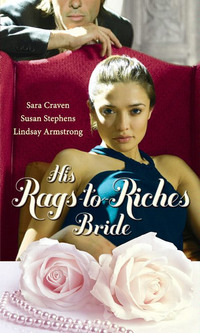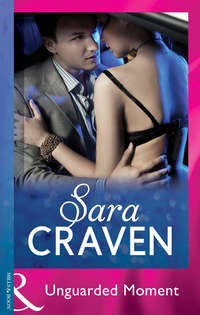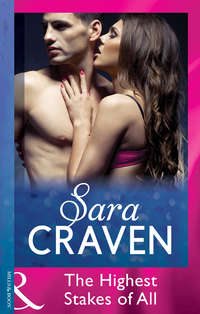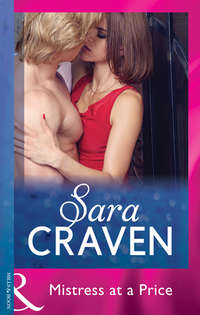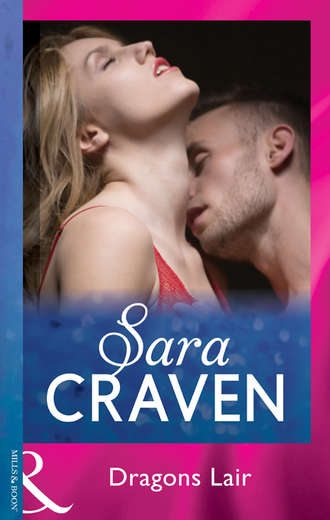
Полная версия
Dragons Lair

Dragons Lair
Sara Craven

www.millsandboon.co.uk
Former journalist SARA CRAVEN published her first novel ‘Garden of Dreams’ for Mills & Boon in 1975. Apart from her writing (naturally!) her passions include reading, bridge, Italian cities, Greek islands, the French language and countryside, and her rescue Jack Russell/cross Button. She has appeared on several TV quiz shows and in 1997 became UK TV Mastermind champion. She lives near her family in Warwickshire – Shakespeare country.
TABLE OF CONTENTS
COVER
TITLE PAGE
ABOUT THE AUTHOR
CHAPTER ONE
CHAPTER TWO
CHAPTER THREE
CHAPTER FOUR
CHAPTER FIVE
CHAPTER SIX
CHAPTER SEVEN
CHAPTER EIGHT
ENDPAGE
COPYRIGHT
CHAPTER ONE
IT was rather stuffy in the small room. The air was heavy with the scent of ageing leather, paper and old-fashioned furniture polish—none of them unpleasant in themselves but oddly oppressive when served up in such a rich mixture. Or was it simply her over-charged emotional state which made them seem so? Davina Greer could not be sure.
She pressed her tongue over her dry lips and cast a longing glance at the tall Georgian windows which gave the impression of having been hermetically sealed since the day they were installed. Then she transferred her gaze to her hands, clasped tensely together in her lap. They were nice-looking hands, she thought judiciously. A little too slender perhaps, but perfectly capable as she had proved over and over again during the past two years. And very bare.
Her lips tightened slightly as almost involuntarily her right hand moved protectively to conceal her left. Surely by this time she should have forgotten what it had been like to wear, briefly, that broad band of antique gold, just as she had tried to forget the emotions she had experienced when it had been placed on her finger.
And in that at least she had succeeded, she thought. Wasn’t that precisely why she was here today?
Mr Bristow was still on the telephone, his voice reassuring, his head nodding firmly as he pressed each point home. They’d hardly had time to do more than exchange a conventional greeting before the call came through, so she had no idea what news he had for her. She stared at the buff folders tied with tape littering the polished top of his desk. One of them she supposed concerned her, but she had no idea which it was. She tried unobtrusively to crane her neck and read some of the names and references printed on the folders, but it was obvious that Mr Bristow was briskly winding up the call, so she leaned back in the comfortable leather chair and tried to give an impression of relaxation.
‘Sorry about that,’ he said as he replaced the receiver. ‘Slight case of panic, I’m afraid.’
‘And you’re looking at another.’ She tried a laugh, but it wasn’t a great success.
Mr Bristow’s eyes studied her keenly for a moment, then he reached for one of the files. It was a very thin one, she noticed, containing only a few papers.
She tried again. ‘I—I hope you have good news for me?’
Mr Bristow pursed his lips. ‘I’m afraid not, or more truthfully, I have no news at all. Your—er—Mr Lloyd has simply not answered any of my letters.’
‘I see.’ Davina bit her lip. ‘Well, perhaps he hasn’t received them. If he’s still moving around all the time …’
Mr Bristow shook his head. ‘When there was no response to the first letter, I sent the remainder by recorded delivery,’ he said. ‘And Mr Lloyd is certainly not—moving around at present. He’s been back in Britain for some considerable time, or so we discovered when we traced him.’
‘Back in Britain?’ Davina echoed bewilderedly. ‘But when? There’s been nothing in the papers about it.’
‘Perhaps he wanted it that way,’ Mr Bristow suggested. He gave the papers in front of him a frowning look. ‘I can assure you that our information is quite correct. He’s resident at present at'—his frown deepened—'Plas Gwyn, Moel y Ddraig. I’m not at all sure my pronunciation is correct, but …’
‘I get the general idea,’ Davina said with a touch of impatience. She was secretly appalled, and her mind was whirling madly. She had accustomed herself for so long to the idea that Gethyn was at a safe distance on the other side of the Atlantic that the news that he had returned quietly, without the blaze of publicity which had attended the majority of his comings and goings in the past, was a severe shock.
At least she could be thankful that he was not actually here in London, she told herself.
She swallowed, forcing herself to speak calmly. ‘So he’s back in Wales. Well, that should make things—easier, surely?’
‘Not if he refuses to reply to our letters,’ Mr Bristow pointed out. ‘Can you think of any explanation for his continuing silence? When you first consulted me, you gave me the strongest impression that your—Mr Lloyd would be only too glad to consent to a divorce.’
Davina’s hands were gripped together so tightly that her knuckles showed white. She said evenly, ‘That was what I had every reason to believe. My—my husband’s—exploits during our separation have been well-enough documented.’ The colour rose faintly in her cheeks. ‘I can’t imagine a single reason why he should wish to prolong this—farce a day longer than necessary.’
Mr Bristow sighed. ‘As I pointed out to you before, newspaper gossip in itself does not constitute acceptable evidence. And you realise of course that if your husband does not give his written consent to the divorce you would have to wait a further three years for your freedom.’
‘But that’s monstrous!’ Davina was indignant.
‘It’s the law,’ Mr Bristow reminded her placidly. He hesitated for a moment. ‘I can always write again, pressing Mr Lloyd for a reply, but I was wondering … Have you—er—Miss Greer—considered the personal approach?’
‘Are you suggesting that I should go to Gethyn and—ask him to agree to a divorce?’
‘It has been done before,’ Mr Bristow said drily. ‘It could result in a perfectly amicable arrangement, particularly as there are only the two of you concerned. Sometimes where there are children to be considered, difficulties can arise, but that isn’t the case here.’
‘No,’ Davina said woodenly. ‘That—isn’t the case. But I was hoping to avoid having to see my husband again.’
‘I think some kind of interview is almost inevitable,’ Mr Bristow said kindly. ‘For one thing, we have to convince the court that a real attempt has been made at reconciliation.’
Davina’s face burned hotly. ‘That’s totally impossible.’
‘Perhaps, but you must at least go through the motions, Miss Greer. It’s not sufficient, I’m afraid, merely to remove your wedding ring and revert to your maiden name. The divorce laws may have eased in recent years, but they are not yet that lax,’ he remarked with something like asperity. ‘Perhaps you would care to think over what I have said and then let me have your further instructions in a day or two.’
‘Yes,’ Davina gave him a constrained smile as she rose to her feet. ‘Maybe that would be best.’
‘I’m sure it would.’ Mr Bristow came round the desk to shake hands cordially with her at the door. ‘Divorce is a messy business, Miss Greer, at the best of times. If there is a chance of reducing the unpleasantness to any extent, then I think you should take it.’
Davina’s thoughts were in total confusion as she emerged from the offices to the warmth of the summer afternoon outside. Officially, she had the rest of the afternoon off, and she supposed she should go home where her mother would be eager to hear what had happened. But she would be expecting to hear that Gethyn had agreed to the divorce and that a date had already been set for the hearing, Davina thought wryly. What had actually transpired would be much less acceptable. Besides, this was one of her mother’s bridge afternoons, and Davina had no wish for her private affairs to feature over the tea-cups once the game was over.
She paused irresolutely on the crowded pavement, then hailed a passing taxi, telling the driver to take her to the Park. At least she would be delaying the inevitable recriminations for a while. Also the stuffy atmosphere in Mr Bristow’s room seemed to have given her a slight headache and she wanted to be able to think clearly.
She had been completely taken aback by Mr Bristow’s suggestion that she should seek Gethyn out and ask him to allow the divorce to go ahead. He had made it all sound so civilised and reasonable, she thought blankly, but then he had not had to suffer those few brief weeks of her marriage to Gethyn.
People said, didn’t they, that to marry in haste was to repent at leisure. Well, she could vouch for the truth of that. Her marriage had been the wild, extravagant impulse of an hour and almost as soon regretted. And now her two years of repentance were drawing to an end and she could be free again—but only if Gethyn agreed. This was what stuck in her throat—this dependence on the whim of a man she had not even seen for two years. That, and the knowledge that he was probably maintaining this silence deliberately to annoy and worry her. There could be no other reason. He had no more wish to continue this nominal relationship than she had.
She paid off the driver and walked slowly into the Park. There were people everywhere and the sun shone down out of a cloudless sky, but Davina felt cold and alone.
Perhaps this hadn’t been such a good idea after all, she thought, skirting a pair of lovers entwined on the grass and oblivious of everything but each other. Once—a long time ago—she and Gethyn had lain like that in this very park and let the world walk indulgently past them. She bit her lip, remembering how he had overcome her reluctance, her protests, drawing her down beside him with compelling hands, his eyes narrowed against the sun laughing up at her, reducing her scruples to absurdity.
Then his mouth had found hers and she was lost, caught in a web of delight from which not even the thought of her mother’s shocked disapproval of such conduct could release her. His lips had explored her face, her throat and shoulders, rousing her nerve-endings to rapturous life. She had been amazed by the ardour of her own response, scared by the feelings his lightest touch could evoke. It had been Gethyn who had moved away first, she recalled painfully, levering himself away from her and sitting for a moment, his head buried in his hands. Then he had looked up and seen her, watching him anxiously, her face flushed, her eyes enormous, her mouth blurred and swollen a little from his passion, and the harshness of his dark face had softened momentarily.
‘Come on.’ He got lithely to his feet. ‘Let’s get out of here before we get arrested.’
The following day, over lunch, he had abruptly asked her to marry him. And she, bewitched by his lovemaking into a frank longing to belong to him completely, had eagerly agreed. It was only later—a long time later—that it occurred to her that he had never said he loved her.
Davina quickened her steps, instinctively fighting the torment that she had released upon herself with these memories. What a child she had been, she lashed herself derisively. No doubt Gethyn had supposed that at nineteen she shared the slick, knowing sophistication of most of her contemporaries. Her eager innocence must have come as an unwelcome surprise to him.
Her mother’s opposition to the marriage had been instant and hostile.
‘You can’t marry him,’ Mrs Greer said, her face white and pinched. ‘A man like that! He must be twice your age, and he’s positively uncouth.’
‘He’s a writer—a poet.’ Davina had tried to reason with her. ‘I know he doesn’t correspond with your idea of one—but he’s famous already …’
‘On the strength of two novels and a few poems,’ her mother had sneered. ‘A television celebrity—until the next nine-day wonder comes along, and then he’ll soon be forgotten about.’
‘Uncle Philip doesn’t think so.’
‘Of course your uncle would defend him.’ Mrs Greer smiled thinly. ‘He’s his publisher, after all. Oh God, I wish you’d never gone to that party, then you would never have met him.’
‘Oh, but I would.’ Davina lifted her head, her eyes shining. ‘It was fate.’
‘Fate!’ her mother scoffed angrily, and turned away. ‘Well, you won’t marry with my consent, Davina.’
‘Then we’ll marry without it,’ Davina said angrily, and saw her mother flinch. Compunction overcame her then, and she went to her, laying a hand on her arm. ‘Mother, if you would just get to know Gethyn—properly.’
‘As you do, I suppose,’ Mrs Greer returned impatiently. ‘How long has this—whirlwind courtship lasted? Three weeks? Do you really imagine that’s a sufficient period of time to find out about a man with whom you intend to spend the rest of your life? If you must continue with this —relationship, why not just become engaged? At least one can withdraw from an engagement honourably before too much harm is done—but marriage!’ Mrs Greer shuddered.
‘I don’t want to withdraw from it,’ Davina said desperately. ‘And neither does Gethyn.’
Her mother’s lip curled. ‘That I can well understand. He’s doing very well for himself, after all. A miner’s son from some obscure pit village in Wales, marrying his publisher’s niece. Another rung on the ladder from rags to riches. Of course he wants to go through with it. He’d be a fool not to. No doubt by now someone will have told him about the money that’s to come to you from your father’s estate when you’re twenty-five, and that will be an added incentive.’
There was a long silence, and then Davina said huskily, ‘That—that’s an appalling thing to say.’
‘The truth often does hurt,’ he mother returned inimically.
Mrs Greer had not attended the ceremony at Caxton Hall a few days later. Uncle Philip had been there, however, with Gethyn’s agent Alec Marks to act as the other witness. It had been swift and rather impersonal and very far from the sort of wedding she had once day-dreamed about when she was younger. Gethyn was different too in a dark formal suit which contrasted strangely with the denims and dark roll-collared sweaters she was accustomed to seeing him wear.
That was what he had been wearing the first time she saw him at the party Uncle Philip had given to launch his new volume of poetry. Poems were often considered by publishers to be a drug on the market, and yet this book would sell, her uncle knew, because Gethyn Lloyd had written it.
The first thing Davina had thought when she set eyes on him was that he didn’t look at all like the star of the show. She had been at many such parties in the past, and writers often, she found, behaved either with a becoming diffidence or an excessive eagerness to please when confronted by the media men, or sometimes both. Not so Gethyn Lloyd.
He hadn’t been the tallest man in the room, yet he had seemed so. There was something about his lean, muscular body, the dark harsh lines of his face, that made the other men seem positively effete. He stood a little apart, gazing broodingly into the glass he held, his dark brows drawn frowningly together above that hawk’s beak of a nose which surely must have been broken at some stage in his career. Then he had looked up suddenly, so suddenly that she had been unable to avert her gaze in time, and his cool green eyes had locked startlingly with hers. And the firm sensual lines of his mouth had relaxed into a smile—not the hurtful mockery she had come so painfully to know later—but with a charm that made her heart turn over.
He came to her side, dealing summarily with a woman journalist from a popular daily who tried to detain him. His eyes swept over her, missing nothing, she thought dazedly, from the dark auburn hair piled smoothly on top of her shapely head to the silver buckles on the shoes just visible beneath the deep plum velvet trousers.
‘I don’t know who you are, but I’d like to take you to dinner tonight.’ His voice was low and resonant, with an underlying lilt which was undeniably attractive.
She smiled. ‘Perhaps you’ll change your mind when you learn my identity,’ she said lightly. ‘I’m Davina Greer.’
He studied her reflectively for a moment, then swung to look at Philip Greer, deep in conversation at the opposite end of the room. ‘Daughter? You’re not much alike.’
‘Niece—and I’m supposed to resemble my mother’s side of the family.’
‘Hm.’ That devastating green glance was on her again, assessing the candour of her hazel eyes under their long sweep of lashes, the high delicacy of her cheekbones and the sweet vulnerable curve of her mouth. ‘Then I must meet her. They say, don’t they, that if you want to know what your girl will look like in years to come, take a look at her mother.’
‘Do they?’ She lifted her brows coolly, trying to conceal the instinctive tremor that had gone through her when he’d said ‘your girl’. ‘I’ve never heard that before.’
‘Oh, I’ve a fund of such information,’ he said softly. ‘Stick with me, lovely, and you could learn a lot.’
She was on her guard instantly, aware that there was an implication in his words that put them squarely into the category of doubtful remarks, to be dealt with by cool politeness. She gave him a formal smile, and changed the subject.
‘Will you be in London long, Mr Lloyd?’
‘Long enough.’ His eyes never left her face. ‘And at least until I’ve persuaded you to have dinner with me.’
‘You’re very persistent,’ she said helplessly.
‘I’ve been accused of worse things,’ he returned laconically. He put out a finger and lifted her chin slightly, forcing her to look at him. ‘What’s the matter? Surely I can’t be the first man who’s fancied you?’
No, she thought, but you’re the first man I’ve ever—fancied, and I don’t know what to do. I’m frightened.
She smiled again, moved slightly so that his hand was no longer even fractionally against her skin. ‘Well, hardly.’
‘So what’s the problem, lovely?’
She managed to meet his gaze. ‘Nothing, I suppose. Thank you, Mr Lloyd. I’d like to have dinner with you.’
Which was a tame way to describe this sweet insidious excitement which was beginning to take possession of her.
‘Good.’ He drained the contents of his glass. ‘Shall we go?’
She stared at him. ‘But the party—it isn’t over yet.’
‘It is as far as I’m concerned. I’ve answered all their questions. Now I’m leaving them in peace to drink and talk at each other, and that’s what they really want to do. Most of them only came here today anyway because someone in the higher echelons suddenly decided that poetry might be trendy. Besides, there’s always a story in me—a miner’s son who can actually string words together like a real person.’
‘That’s rather bitter, isn’t it?’
‘Probably, but it’s the way I’m feeling at the moment. Indepth interviews and expensive whisky seem to affect me like that. I’m relying on you to exorcise all my evil spirits.’
‘That sounds a tall order on such a short acquaintance.’ She pulled a wry face.
‘Who said our acquaintance was going to be short?’ he said. ‘And you don’t have to worry. I think, if you wanted, you could coax wild beasts and dragons to eat out of your hand if you put your mind to it.’
She was embarrassed at the personal turn to the conversation and took refuge in flippancy. ‘Even a Welsh dragon?’
He gave her a long look, and she made herself meet it steadily.
‘Oh, that most of all, girl,’ he said. ‘That most of all.’
Somehow she found herself apologising to Uncle Philip for her early departure and calling goodbyes to the surprised glances which were noting it around the room.
As they waited for the lift in the corridor, she began to laugh.
‘It’s far too early for dinner. There won’t be a restaurant open.’
‘Then we’ll walk and talk and generally further our short acquaintance.’ He allowed her to precede him into the lift. The doors closed noiselessly, shutting them into a tight enclosed world where they were quite alone.
Davina said breathlessly, ‘We need the ground floor. You have to press the button.’
He slanted a glance at her. ‘I’ve been in lifts before. Why are you so nervous?’
She moistened her lips. ‘I’m not.’
‘Don’t lie to me, Davina. Not now, not ever. What do you imagine I’m going to do? Leap on you?’
She felt herself go crimson. ‘Of course not,’ she denied too quickly.
His lips twisted slightly. ‘Then you’re far too trusting,’ he told her mockingly, and sent the lift on its way to street level.
She was recalled abruptly back to the present as a child’s coloured ball bounced towards her and she instinctively put out a foot to stop it. She stood quite still for a moment, assimilating her surroundings, and telling herself that these things were all in the past now and could only have the power to hurt her if she allowed them to. But her eyes were stinging suddenly and she fumbled in her handbag for her dark glasses, insisting to herself that it was only the sunlight that was too strong.
She was dazzled now, as she’d been dazzled then, and as she walked on, the words, ‘Too trusting. Too trusting …’ began to sound a bitter knell in her tired brain.
In the end, she took another taxi and went back to the office. The publishing firm of Hanson Greer was situated in a quiet street not far from the Post Office Tower. She pushed open the glass door and went in with a smile for the receptionist in her panelled cubicle. She accepted a list of the people who had telephoned her during her absence and took the lift up to her office.
Her mother had not wanted her to work here, yet at the time it had seemed a perfectly logical thing to do. Her father had been a director of the firm until his death, and if she had been a boy, it would have been quite natural for her to follow him into publishing. And this was supposed to be the age of equal opportunities, so … Besides, Uncle Philip’s offer of a job had come just when she needed it most—when she was looking round desperately for something to fill this emotional vacuum inside herself, and she had seized it with relief.
She knew the reason for her mother’s opposition, of course. She was terrified that Davina would be brought into contact with Gethyn again through her work. But it hadn’t happened. For one thing, as far as she had known until today Gethyn was still in America, teaching creative writing at some New England college. And for another, in the two years they had been apart, he had apparently not produced another manuscript of his own. While he had been in the States, he had written the screenplay for the successful film of his first book, A Power for Good, but no new work had been forthcoming from him, and although he had never discussed it with her, Davina knew this had been a major disappointment for her uncle.
She went into her small room and sat down with a sigh, her eyes fixed absently on the scrap of paper in her hand. She really ought to make a start on returning these calls. One of them at least would probably be urgent. But the names and numbers kept dancing meaninglessly in front of her eyes, and eventually she dropped the piece of paper impatiently into her in-tray to await her attention in the morning.
Her door opened and the smooth fair head of Jan Preston, her uncle’s secretary, appeared.
‘Oh, you are back,’ she exclaimed in surprise. ‘I’ve been trying to get you at home. Mr Greer would like a word with you.’
Davina groaned inwardly. For a moment she toyed with the idea of asking Jan to forget she had seen her while she made her escape, but she soon abandoned it. Jan was a pleasant woman, but she was simply not on those kind of terms with her. So instead she smiled and murmured her thanks, promising she would be along presently.


